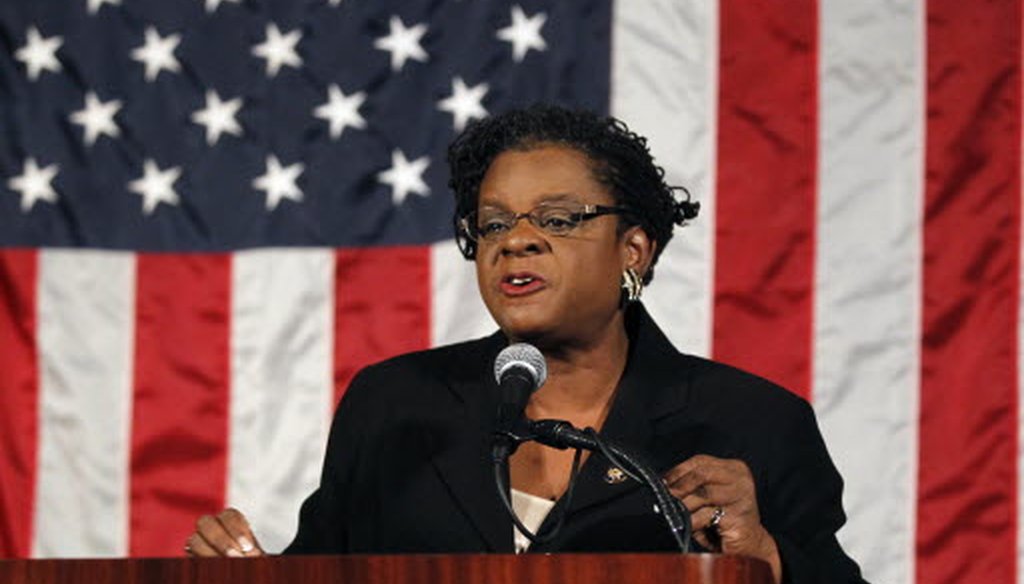Stand up for the facts!
Our only agenda is to publish the truth so you can be an informed participant in democracy.
We need your help.
I would like to contribute

Criticism from conservatives rained down on U.S. Rep. Gwen Moore after she tied sexual assaults in the military to military culture.
About a week after a Pentagon report estimated that 26,000 members of the armed forces were sexually assaulted in 2012, President Barack Obama promised to "leave no stone unturned" to halt sexual abuse in the military.
A few days later, on May 19, 2013, U.S. Rep. Gwen Moore blamed military culture -- "which is about aggression and about war" -- for the military’s sexual assault problem.
The Milwaukee Democrat's interview on MSNBC drew sharp criticism from conservatives such as Wisconsin radio talk show hosts Jerry Bader and Charlie Sykes; Sykes called Moore's comments a "casual smear of the military."
Moore's take and the reaction to it create a space for In Context, an occasional feature that tells more of the story about statements that get widespread attention.
Here’s a transcript of Moore’s interview with host Alex Witt:
Sign up for PolitiFact texts
Witt: Joining me now, Democratic Congresswoman Gwen Moore, who herself is a survivor of sexual assault. And I want to thank you so much for being here. I’d like to ask you about what happened Thursday. When you heard the president, he was speaking powerfully about military rape. But from what you just heard from (White House spokesman) Dan Pfeiffer, does it give you confidence in big changes?
Moore: Well, I can tell you that when you look at the mission of the military and military culture, which is about aggression and about war, it shouldn't surprise us at all that sexual assault would surface as a huge issue that they need to look at. And I do think that they would revisit earlier statements to not take this out of the chain of command. We need to look at whether or not the chain of command can deal with the multitude issues that arise out in sexual assaults. We have training issues, given women's rise in power in the military, the repeal of don't ask/don't tell. Certainly, training issues. And as the executive director of the Women's Action Network said, we're not going to train our way out of this issue. So, we do have to look at changing, taking it out of the military chain of command, not allowing the military to reverse decisions about sexual assault. About giving victims some recourse so that they don't think -- so that the stigma of reporting and the fear of reporting won't prevent them from reporting the 70-plus numbers of sexual assault that occur on a daily basis. I think that this has to be taken very, very seriously and a 250-year history of military rule over this issue has got to be revisited.
Witt: Yeah, and it is shocking. You give that number, 70 unreported assaults a day. I mean it’s three an hour, it breaks down to. It is just shocking. And I think it's fair to say that you were even outraged with your Republican colleagues during the debates over the Violence Against Women Act. Your floor speech was very emotional. Is there that same party divide on the military issue?
Moore: You know what, when you hear statements like, It's just sort of a high school thing, I think a huge part of sexual assault is this notion that somehow it's just a part of a rite of passage for men to be aggressive and to be able to express themselves in sexual ways. The defense that, Hey, they wanted it, or we were -- it was just horseplay, if you listen to a Jerry Sandusky. I think this is a very, very serious cultural issue. And, again, if you're looking at military culture of aggression and violence, I think it's very, very easy for it to seep over into sexual assault. There's also been a lot of discussion about some of the resentment that might come from women being able to rise in the ranks of the military, which puts them at particular risk in the chain of command. About the repeal of don't ask/don't tell, where men who may appear to be effeminate can be victimized. So, I do think that discipline in the military is something that needs to be a balancing act with the aggression that’s part of the culture, as well. And the mental health issues, we've got sexual predators in the military. There's -- a lot of these assaults are serial rapists.
Witt: But given what you've just talked about, it seems like it's almost an uphill battle for a woman to come forward, or a man to come forward, and talk about having been sexually assaulted. What do you say to that person who’s hesitant to do so?
Moore: Again, that's why we ought to look at there being a separate legal path for victims making their complaints, other than up the military chain of command. We certainly have very qualified legal departments and representations, we have legislation that's being proposed separately about victims' advocacy panels, so that there are opportunities for victims to come forward without fear of retaliation.
Witt: All right, Wisconsin Democratic Congresswoman Gwen Moore. I"ll look forward to welcoming you back to the program. Thank you so much.
Our Sources
MSNBC, transcript and video of Alex Witt interview of Rep. Gwen Moore, May 19, 2013
JSOnline All Politics Blog, "Gwen Moore sees link between military culture and sexual assaults in military," May 20, 2013






















